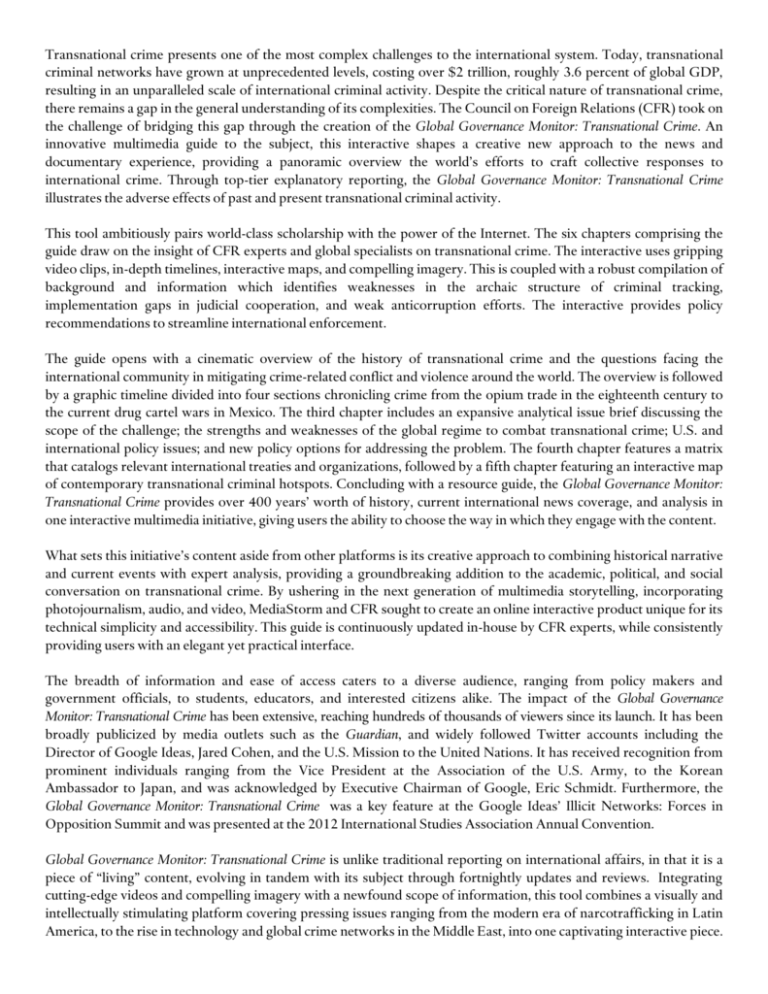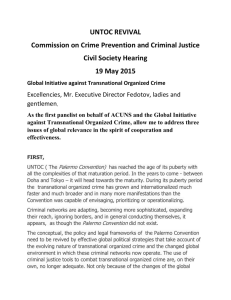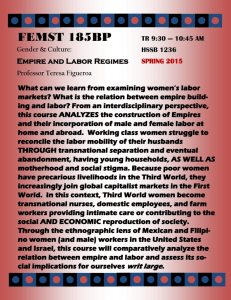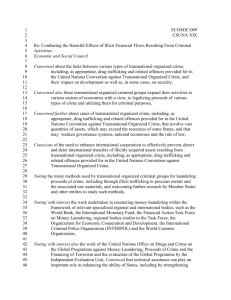The Global Governance Monitor: Transnational Crime opens with a
advertisement

Transnational crime presents one of the most complex challenges to the international system. Today, transnational criminal networks have grown at unprecedented levels, costing over $2 trillion, roughly 3.6 percent of global GDP, resulting in an unparalleled scale of international criminal activity. Despite the critical nature of transnational crime, there remains a gap in the general understanding of its complexities. The Council on Foreign Relations (CFR) took on the challenge of bridging this gap through the creation of the Global Governance Monitor: Transnational Crime. An innovative multimedia guide to the subject, this interactive shapes a creative new approach to the news and documentary experience, providing a panoramic overview the world’s efforts to craft collective responses to international crime. Through top-tier explanatory reporting, the Global Governance Monitor: Transnational Crime illustrates the adverse effects of past and present transnational criminal activity. This tool ambitiously pairs world-class scholarship with the power of the Internet. The six chapters comprising the guide draw on the insight of CFR experts and global specialists on transnational crime. The interactive uses gripping video clips, in-depth timelines, interactive maps, and compelling imagery. This is coupled with a robust compilation of background and information which identifies weaknesses in the archaic structure of criminal tracking, implementation gaps in judicial cooperation, and weak anticorruption efforts. The interactive provides policy recommendations to streamline international enforcement. The guide opens with a cinematic overview of the history of transnational crime and the questions facing the international community in mitigating crime-related conflict and violence around the world. The overview is followed by a graphic timeline divided into four sections chronicling crime from the opium trade in the eighteenth century to the current drug cartel wars in Mexico. The third chapter includes an expansive analytical issue brief discussing the scope of the challenge; the strengths and weaknesses of the global regime to combat transnational crime; U.S. and international policy issues; and new policy options for addressing the problem. The fourth chapter features a matrix that catalogs relevant international treaties and organizations, followed by a fifth chapter featuring an interactive map of contemporary transnational criminal hotspots. Concluding with a resource guide, the Global Governance Monitor: Transnational Crime provides over 400 years’ worth of history, current international news coverage, and analysis in one interactive multimedia initiative, giving users the ability to choose the way in which they engage with the content. What sets this initiative’s content aside from other platforms is its creative approach to combining historical narrative and current events with expert analysis, providing a groundbreaking addition to the academic, political, and social conversation on transnational crime. By ushering in the next generation of multimedia storytelling, incorporating photojournalism, audio, and video, MediaStorm and CFR sought to create an online interactive product unique for its technical simplicity and accessibility. This guide is continuously updated in-house by CFR experts, while consistently providing users with an elegant yet practical interface. The breadth of information and ease of access caters to a diverse audience, ranging from policy makers and government officials, to students, educators, and interested citizens alike. The impact of the Global Governance Monitor: Transnational Crime has been extensive, reaching hundreds of thousands of viewers since its launch. It has been broadly publicized by media outlets such as the Guardian, and widely followed Twitter accounts including the Director of Google Ideas, Jared Cohen, and the U.S. Mission to the United Nations. It has received recognition from prominent individuals ranging from the Vice President at the Association of the U.S. Army, to the Korean Ambassador to Japan, and was acknowledged by Executive Chairman of Google, Eric Schmidt. Furthermore, the Global Governance Monitor: Transnational Crime was a key feature at the Google Ideas’ Illicit Networks: Forces in Opposition Summit and was presented at the 2012 International Studies Association Annual Convention. Global Governance Monitor: Transnational Crime is unlike traditional reporting on international affairs, in that it is a piece of “living” content, evolving in tandem with its subject through fortnightly updates and reviews. Integrating cutting-edge videos and compelling imagery with a newfound scope of information, this tool combines a visually and intellectually stimulating platform covering pressing issues ranging from the modern era of narcotrafficking in Latin America, to the rise in technology and global crime networks in the Middle East, into one captivating interactive piece. For all of the reasons above, we at the Council on Foreign Relations believe the Global Governance Monitor: Transnational Crime represents a distinguished example of continuous, interpretive news coverage, worthy of an EMMY Award. Global Governance Monitor: Transnational Crime: http://www.cfr.org/global-governance/global-governancemonitor/p18985?co=C028801#/Crime/Overview%20Video/ VIDEO BLURB: The Global Governance Monitor: Transnational Crime opens with a cinematic overview of the history of transnational crime and the challenges facing the international community in mitigating crime-related conflict and violence around the world. With just under ten minutes to capture the interest of the viewer, this video aims to educate, entertain, and enrich. Through the use of striking graphics, audio and video footage of influential global leaders, and by highlighting current global crime news stories, this video provides an in-depth and comprehensible overview of transnational crime aimed at a diverse audience, ranging from policy makers and government officials, to students, educators, and interested citizens alike.








